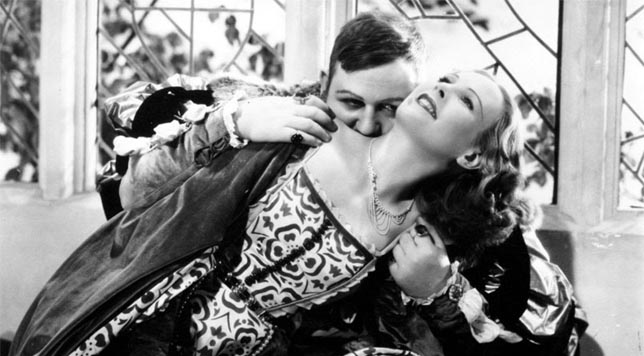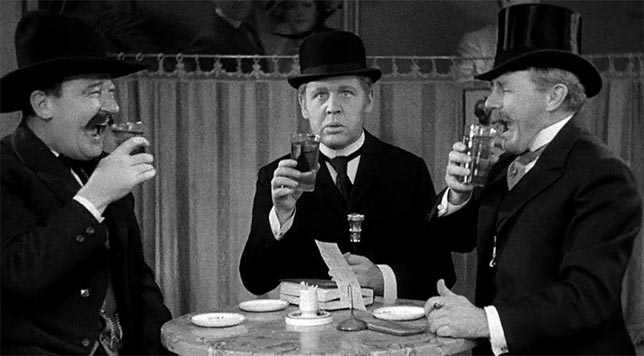All the King’s Men (1949). 109 minutes. Directed by Robert Rossen. Starring Broderick Crawford (as Willie Stark), John Ireland (as Jack Burden), Joanne Dru (as Anne Stanton), John Derek (as Tom Stark), Mercedes McCambridge (as Sadie Burke), Shepperd Strudwick (as Adam Stanton), Anne Seymour (as Lucy Stark), Katharine Warren (as Mrs. Burden), Will Wright (as Dolph Pillsbury), Raymond Greenleaf (as Judge Monte Stanton), and Walter Burke (as Sugar Boy).
If you have seen Born Yesterday (1950), the wonderful movie about a woman (played by Judy Holiday) who learns about American democracy and in doing do is inspired to end an abusive romantic relationship, you may remember Broderick Crawford as the politically aspiring businessman and thug Harry Brock—the person from whom Holiday’s character frees herself. Crawford’s Brock is brutish and malevolent, but Born Yesterday is not the first time the actor played a civic-minded and power-hungry antagonist. A year earlier he was in the astounding but perhaps today less well-known All the King’s Men, playing Willie Stark, a more complicated villain. Crawford won an Academy Award for his performance in All the King’s Men, and it is not hard to see why. Whereas Born Yesterday expresses the idea that democracy is fundamentally a thing of beauty, capable of liberating us politically but also personally, All the King’s Men posits that democracy is a corrupt, immoral business and that it is capable of breeding its own kind of tyrant. It has to be one of the most impressively acted, captivatingly written, and depressing movies about American politics ever made.
When the movie opens, reporter Jack Burden is sent by his newspaper to cover an up-and-coming candidate making a name for himself in local politics: that man is Willie Stark. Earnest, honest, and dedicated to helping people, Stark positions himself as a voice of the rural poor. Soon Burden’s coverage of Stark’s campaign helps to establish Stark as a formidable politician. Stark runs for governor, and Burden introduces him to his girlfriend Ann Stanton, her brother Adam (a physician), and her uncle (Judge Monte). When Stark wins the election, Burden and the Stantons all become involved in Stark’s government. But the more power Stark amasses, the more corrupt he becomes, and his malfeasance adversely affects Burden, the Stantons, and others who cross his path. Stark’s empire comes to a violent end, and the movie closes with him muttering deliriously as he dies of an assassin’s bullet.
All the King’s Men is a rare Golden Age American movie in that it takes a hard and unflinching look at political success in the U.S. and ends in full-blown tragedy mode without uplifting or reassuring us about the nobility of our system of government. But it is also remarkable for the way that it does this while insisting on a fair amount of universality within the American system it depicts. For example, it both does and does not identify the Willie Stark character with a particular political ideology. Stark is clearly aligned with a certain brand of populism, and yet he is depicted independent of geography or political party so that the story remains widely applicable. Louisiana governor Huey Long, who was similarly assassinated, was the inspiration for the Stark character, but while the movie shows Stark’s home in a farming community and demonstrates his appeal in rural areas, he and his constituents could hail from the countryside in any part of the U.S. For the most part, no one speaks with obvious traces of southern American dialect, and the state Stark resides in is never identified by name.
Stark’s journey from earnest small-town candidate to corrupt big-league governor is impressive and subtle. His campaign gets kickstarted into action when he learns that he is being manipulated by another politician, set up as a dummy candidate to draw away votes from an opponent. Stark starts to drink in reaction to this news that he was not astute enough to perceive on his own, and when he arrives at a country fair where he is scheduled to speak, he is ironically more powerful, focused, and charismatic while intoxicated. He tells the crowd the story of a rural hick (using that language), someone who suffers and is pushed around. He repeats the word “hick” often. It is obvious that he is talking about himself, but then he makes a bold move. He starts applying the pejorative “hick” not merely to himself but to his audience. They are hicks just like him, he says, but it is not merely that they share the common background implied by this term, or the self-loathing that it transmits. It is that they are all ridiculed, shamed, and looked down upon in some way. The word “hick” sounds harsh and cruel in the mouth of Stark, but he actually redeems it and his listeners, uniting them by insulting them. It is a fascinating strategy, invented on the spot, and offers us insight into Stark’s mindset, with its weird mixture of humanizing and dehumanizing impulses.
In Stark’s political scheme, uplifting and denigrating people go hand in hand, with often devastating results. All the King’s Men offers a pretty bleak view of what the man of the people who ascends to office brings about in the wild: graft, corruption, blackmail, drunkenness, reckless behavior, serial adultery, betrayal, brutal murder, and assassination. Stark will come to use his power to obtain more power, protect himself, indulge in lascivious behavior, evade consequences, and remove obstacles. He silences the press, disrupts judicial proceedings, and disappears an opponent. It does not get much worse in American politics. But as Stark’s behavior worsens, his following intensifies. The people around him—Burden, the Stantons—believe they can control him but learn that a political demagogue cannot be tamed merely by his support staff, especially when he perceives that his base continues to celebrate him.
When Stark first comes on the scene, however, and tries to make an impression on voters, we see that the system is already corrupt, not ideal. Stark addresses a crowd on the streets and is silenced by the police, who demand a permit for a group greater than five to gather in public. They seize his fliers, and they take a camera away from a newspaperman who is documenting the event. Later in a pool hall, the journalist gets his camera back, but not the pictures. The local commissioner who returns the empty camera tells Stark with a grin that he is all for free speech. Later someone destroys the front window of Stark’s house. It is as if the county were run by the mafia. I suppose the one good thing we can say for Stark is that while he becomes an anti-democratic sleaze, he does not invent anti-democratic sleaze on his own.
Given the movie’s tenor, it seems almost unbelievable that the actor John Wayne was initially offered the role of Stark. He turned it down, inflamed—he said that (because of its cynicism) All the King’s Men told a decidedly anti-American story. But while the movie does acknowledge that elected officials can develop a malevolent, all-consuming taste for power and depicts the full range of dark consequences that can result, its frankness about the potential for the system to be perverted is actually most American. After all, Americans have always valued voices, both in the political and in the creative spheres, that are critical of their government.
Still, it is true that All the King’s Men offers an at times disturbing glimpse into how our cherished political processes can be overturned by voracious leaders who nevertheless resonate with the public through populism and coarse rhetoric, and this view will not appeal to everyone on account of its gloominess. Yet perhaps one thing that Wayne missed is that the outward ideology of Stark’s campaign, in spite of Stark’s decrepit morality and his crudeness, remains weirdly upbeat and life-affirming in its rhetoric. His message is the standard populist line of fewer taxes for farmers, more education for the rural poor, and better access to health care for the needy. At least that is what populism looked like in the early twentieth century; the Willie Stark of today would presumably be peddling different, darker fare. In the film, Stark at least seeks to inspire his constituents and encourage them to contribute to society.
Remarkably, although the movie is otherwise rich in pessimism, it has so many wonderful characters and stories to share. There is Sadie Burke, for example, the extremely jaded political strategist played by Mercedes McCambridge who at first exploits Stark, then helps him, then has an affair with him, and continues to nurture him even though he betrays her. (McCambridge won an Oscar for her performance.) John Ireland as Jack Burden, the campaign aide through whose eyes we see Stark, is a wonderful, world-weary, Joseph Cotten-type of actor. And the Stanton family that Burden worships and adores is so richly developed: beautiful and life-affirming Ann, beholden at first to Jack but soon to sell herself to Stark in her devotion to his demagoguery; her brother Adam, the physician—a DeForest Kelley look-a-like who analyzes Stark carefully in some wonderful conversations; and their uncle Judge Monte, whose past holds a secret so personally upsetting to him that we are not fully informed of it. When Monte takes his own life after Stark reveals that he knows this secret, the reason remains dark and mysterious. All of these characters attempt to understand Stark in their own way. Through their affiliation with him they attempt to reap the benefits for their particular agenda, but all of them lose the things that are most important to them, and through Stark they are utterly destroyed.
The disintegration of the Stanton family at the hands of Stark does not come without ample warning, however. Adam has a wonderful discussion with Stark midway through the picture, when in a cheap philosophical moment of self-justification, Stark tries to tell him that good things only come from bad things. Adam is skeptical of the ease with which this philosophy is reasoned through, and he challenges Stark on it. They go back and forth, until Stark announces that this is not a time for words but a time for action. This should be a sign to everyone in the room that their leader is a problem, not merely because Stark’s idea is bad but also because he seems to be asserting it fashionably without being able to defend it effectively. But even more troubling is the way that Stark and his circle restate the philosophy expressed on that night as if the conversation with Adam has never happened. There is something to be said for good coming out of a bad situation, but the idea that there is nothing to be done about the bad—that is where Stark crosses over into a kind of brutish acceptance of evil that corrodes his movement.
For much of the movie, Stark seems untouchable. He distances himself from the crimes he commits and surrounds himself with people to buffer and protect him from anyone who seeks to hold him accountable for his actions. But ultimately the movie suggests that even those who evade justice within the American system can fall dramatically because of the fragility that binds us all as humans. That Stark dies a classic tyrant’s death in the end speaks to the most basic limits of power imposed on us by the material world. That it takes an illegal act borne out of emotion to bring him down rather than the legal process at the heart of our democracy is the crux of the movie’s depressing commentary on the flaws of the system that governs us.







